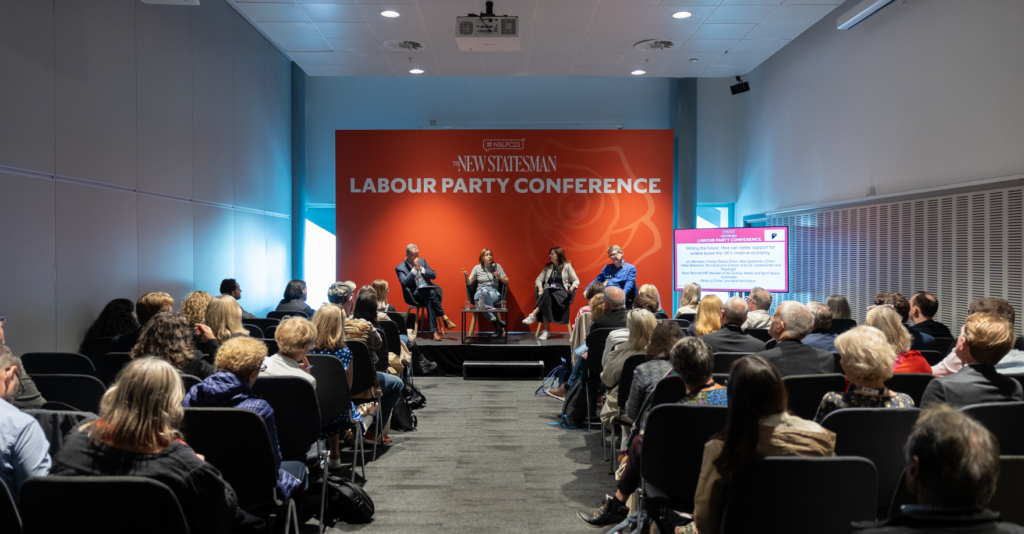
ALCS hosts panel for better writer support at Labour Party Conference
‘Writing the future: How can better support for writers boost the UK’s creative economy?’ took place at the Labour Party Conference in Liverpool last Monday and was organised by ALCS in partnership with the New Statesman.
ALCS hosted a popular fringe event at the recent Labour Party Conference to discuss the realities of creative employment and the potential policy remedies to better protect and pay writers. ALCS was represented on the panel by Non-Executive Director and award-winning TV writer Helen Blakeman. Helen was joined by Culture, Media and Sport Select Committee member, Kevin Brennan MP, and journalist and author, Marie Le Conte. The session was moderated by freelance technology journalist, Jon Bernstein.
The session began by outlining the immense challenges faced by writers; falling remuneration, dwindling development pots and reduced opportunities coupled with implications on the future of work due to the rise of AI, that provide a perfect storm for writers and the wider creative community.
Marie Le Conte spoke about the impact that declining pay will have on diversity within the creative sector: “More and more, the creative industries is an industry that people can only work in if they somehow have money from elsewhere, which just does not feel like the way things should be going.”
Kevin Brennan was similarly concerned for the long term health of our industries in the UK due to the threats posed by AI and the government’s lack of engagement with the creative sector on this issue: “Artificial intelligence is an incredible technology and can be a great force for good, as all technologies can, but it needs guardrails put in place and we need to go back to the principles of creative remuneration.”

The panel discussed a number of potential solutions to these issues. Helen Blakeman highlighted the Smart Fund proposal that we actively campaign for. This involves technology companies allocating a small fraction of the sale of digital devices into a fund that will be paid out to creators.
Kevin Brennan MP expressed encouragement for the proposal, having been impressed by the evidence we provided at a recent CMS Committee hearing: “We need to explore things like the Smart Fund for writers to make sure that there isn’t a permanent built-in decline in creative remuneration.”
Helen Blakeman called for a Freelancer Commissioner, saying: “We need a Commissioner to represent and to be that port of call between government and industry. And for somebody who has that understanding and can educate legislators and advocate for freelancers.”
Kevin Brennan MP also spoke favourably of the proposal, saying: “In policy terms, you can justify [a Freelancer Commissioner] because freelancers don’t have the same ability to bargain collectively. And we saw during COVID how the government ignored hundreds of thousands of freelancers in the support that they gave to parts of the workforce. So I think there’s a very strong case that freelancers need more support.”
Marie Le Conte stated that cultural changes are also needed to improve pay and conditions for creatives: “People want to work in the creative industries, so I think a lot of places assume that even if they pay really badly, there’s always going to be someone willing to do it for the exposure or because they don’t need the money. If we can encourage a cultural change in some way, then that would already go some way towards changing things”
This was echoed by Helen who spoke about a culture of uncertainty and fear for TV writers: “Every phone call from your script editor, you expect to be sacked. And so you are told what your script fee is but then you are only paid in increments, and you know that you may never ever earn that full amount. So you write in fear a lot of the time.”
Helen illustrated the impact of a worsening employment landscape, even for well-established creators, due to the worrying decline in the number of available jobs and commissions within the audiovisual sector: “We want writers to be fairly remunerated for their work. However, what I’m concerned about is that soon those secondary rights won’t exist because the original works won’t be there to exploit commercially.”
You can learn more about the issues we campaign on to improve conditions for writers here.
